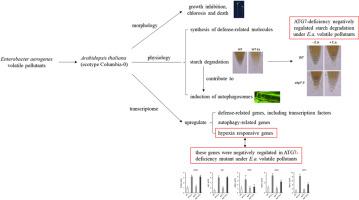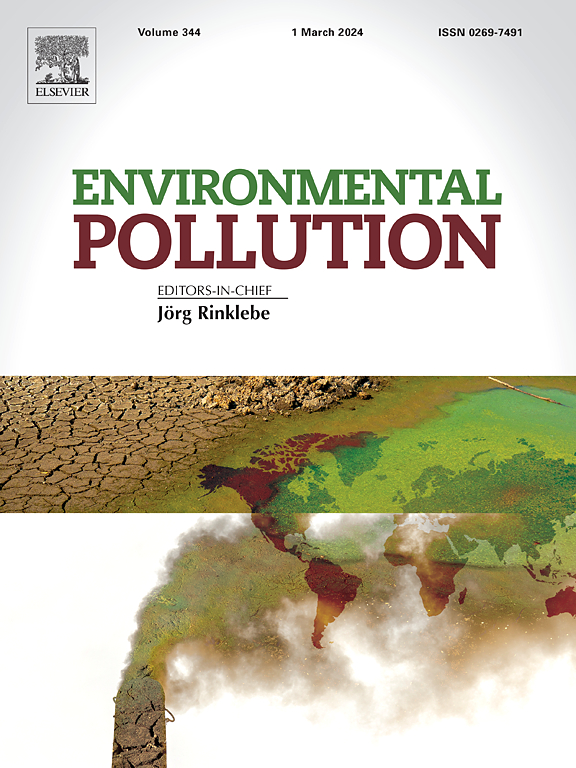自噬在微生物挥发性污染物诱导的淀粉降解和缺氧反应基因表达中的可能作用
IF 7.3
2区 环境科学与生态学
Q1 ENVIRONMENTAL SCIENCES
引用次数: 0
摘要
自噬被认为在营养代谢和基因表达的调控中起关键作用。然而,在暴露于微生物挥发性污染物的植物中,其在调节淀粉代谢和缺氧反应基因中的作用知之甚少。在本研究中,我们发现拟南芥暴露于产气肠杆菌(E. aerogene)挥发性污染物中会诱导自噬,这表明自噬体的形成。暴露还导致自噬相关基因上调,如ATGs、NBR1、ATI1和atg8e调节转录因子。此外,暴露于产气荚膜杆菌挥发性污染物诱导拟南芥幼苗根部淀粉降解。最后,我们发现atg7缺乏会对缺氧反应基因(HRE1、HRA1和ADH1)的表达和气原肠杆菌挥发性污染物诱导的淀粉降解产生负面影响。综上所述,我们的研究表明,微生物挥发性污染物可以诱导淀粉降解和自噬,参与一些缺氧反应基因和淀粉代谢的调控。这些发现有助于确定微生物挥发性污染物暴露下自噬在植物养分代谢和基因表达调控中的作用。当生物体面临微生物挥发性污染物的挑战时,所获得的见解可能有助于农业管理。本文章由计算机程序翻译,如有差异,请以英文原文为准。

Possible role of autophagy in microbial volatile pollutant-induced starch degradation and expression of hypoxia responsive genes
Autophagy is thought to be critically involved in the regulation of nutrient metabolism and gene expression. Nevertheless, little is known about its role in regulating starch metabolism and hypoxia responsive genes in plants exposed to microbial volatile pollutants. In the present study, we found that exposure of Arabidopsis to Enterobacter aerogene (E. aerogene) volatile pollutants induced autophagy, as indicated by autophagosome formation. The exposure also caused upregulation of autophagy-associated genes, such as ATGs, NBR1, ATI1, and ATG8e-regulating transcription factors. Additionally, exposure to E. aerogenes volatile pollutants induced starch degradation in the roots of Arabidopsis seedlings. Finally, we found that ATG7-deficiency negatively affected the expression of hypoxia-responsive genes (i.e HRE1, HRA1, and ADH1) and starch degradation induced by E. aerogenes volatile pollutants. Overall, our study reveals that microbial volatile pollutants can induce starch degradation and autophagy, which participates in the regulation of some hypoxia-responsive genes and starch metabolism. These findings help to define the role of autophagy in plant nutrient metabolism and regulation of gene expression under microbial volatile pollutant exposure. The insights gained may contribute to agricultural management when living organisms face challenges from microbial volatile pollutants.
求助全文
通过发布文献求助,成功后即可免费获取论文全文。
去求助
来源期刊

Environmental Pollution
环境科学-环境科学
CiteScore
16.00
自引率
6.70%
发文量
2082
审稿时长
2.9 months
期刊介绍:
Environmental Pollution is an international peer-reviewed journal that publishes high-quality research papers and review articles covering all aspects of environmental pollution and its impacts on ecosystems and human health.
Subject areas include, but are not limited to:
• Sources and occurrences of pollutants that are clearly defined and measured in environmental compartments, food and food-related items, and human bodies;
• Interlinks between contaminant exposure and biological, ecological, and human health effects, including those of climate change;
• Contaminants of emerging concerns (including but not limited to antibiotic resistant microorganisms or genes, microplastics/nanoplastics, electronic wastes, light, and noise) and/or their biological, ecological, or human health effects;
• Laboratory and field studies on the remediation/mitigation of environmental pollution via new techniques and with clear links to biological, ecological, or human health effects;
• Modeling of pollution processes, patterns, or trends that is of clear environmental and/or human health interest;
• New techniques that measure and examine environmental occurrences, transport, behavior, and effects of pollutants within the environment or the laboratory, provided that they can be clearly used to address problems within regional or global environmental compartments.
 求助内容:
求助内容: 应助结果提醒方式:
应助结果提醒方式:


